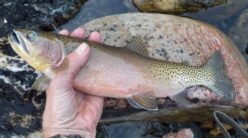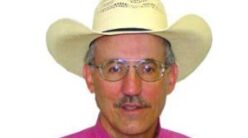From time to time the anti-hunters — not to be confused with non-hunters — like to write letters to the editor of their local news papers opposing hunting and hunters for ridiculous reasons. Hunters have been accused of being blood-thirsty brutes who just can’t wait for hunting season to start so we can go kill everything in sight for a month or so each year, not to mention some species that can be killed all year long, although a hunting license is required for coyotes.
Not too long ago, a naive writer even wrote in to the Idaho State Journal complaining that there were two columns a week that promoted killing our precious wildlife. The only thing that was valid in his comments was that our wildlife is precious and should be intelligently managed and preserved.
I am almost amused by people who drive cars with leather seats, buy leather furniture, wear leather shoes, belts, hats, clothes and fur coats who then complain about hunters and hunting. It seems hypocritical to me.
I actually laughed at an individual who suggested hunters ought to go buy their meat at the grocery store so no animals would have to be killed.
The fact is that hunters are the most important group of wildlife preservationists, doing more to preserve wildlife for future generations than any other group. Let me give you a few examples of hunter’s conservation efforts.
- In 1907, there were only 41,000 elk remaining in North America. Thanks to money and hard work spearheaded by hunters, today there are more than a million.
- In 1900, there were only 500,000 white-tailed deer left. Today, there are more than 32 million because of conservation efforts spearheaded by hunters.
- In 1950, only 12,000 pronghorn remained. Conservation efforts by hunters have now increased that number to more than 1.1 million.
- Through state licenses and fees, hunters pay $796 million a year for conservation programs that have brought species such as turkeys from 100,000 in 1900 to 7 million today, and ducks from the brink of extinction in 1901 to more than 44 million today,
- Through donations to groups like the Rocky Mountain Elk Foundation, hunters add $440 million a year to conservation efforts.
- In 1937, hunters themselves pushed for an 11 percent tax on guns, ammo, bows and arrows to help fund conservation efforts. Because of those efforts the Pittman Robertson Act was passed and has raised more than $131.2 billion for wildlife conservation.
- All together, hunters pay more than $1.6 billion a year for conservation programs. No one else even comes close to giving a much for conservation of wildlife.
- Hunting funds conservation and the economy, generating $38 billion a year in retail sales of all kinds of outdoor and hunting equipment, some of which aren’t taxed to support conservation efforts.
- Hunting supports 680,000 jobs, from game wardens to waitresses and biologists to motel clerks.
- Hunters are the money behind the Rocky Mountain Elk Foundation’s 7 million-plus acres of habitat restoration. About 95 percent of the Rocky Mountain Elk Foundation’s 222,000 members are passionate hunters.
- With funding from hunters The Rocky Mountain Elk Foundation has been able to restore wild elk herds in seven states and Canadian provinces.
As society loses its ties to wildlife and conservation, the bonds with nature developed by hunters will be the greatest hope for creating the next generation of true conservationists.
I could have described more reasons that hunters are the most important wildlife conservationists in the country and are the model for wildlife conservation efforts in other countries around the world, but I think I have made my point. If you would like to know more, I encourage you to stop in at the local Fish and Game office and talk to them about hunting and conservation, or you can look up the Idaho Fish and Game Department online and read about all the conservation projects that hunters are involved in here in Idaho and across the nation.
Smokey Merkley was raised in Idaho and has been hunting since he was 10 years old. He can be contacted at mokeydo41245@gmail.com.



